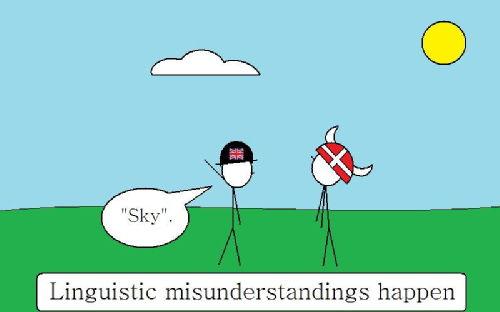Dear English People,
Forgive me for saying this, but I believe your entire language could need to be revised, so as to eliminate all the illogical idioms, expressions and pronunciations that have appeared over the years.
Don't misunderstand me, English is not the only language to which this applies. In fact most languages I know could do with a quick fix in order to get rid of irregular verbs and confusing terms. I do not mean to criticise anyone. If I may sound harsh at times, keep in mind that I don't mean any of this seriously, that these are merely examples of things that may seem bizarre to a beginner learning English, and that by symmetry it reflects the frustrations that English people may encounter when learning a foreign language. Every language has a few quirks and oddities. Even Danish.
But we might as well start somewhere. In the same way that a militant atheist may start by picking apart the Bible before scrutinising other Holy Scriptures, I shall have a look at the absurdities of the English language before anything else.
First, something that I came across a few days ago when a friend of mine asked me about the difference between the two french words "savoir" and "connaître". The answer is: "Savoir" means "To know", while "Connaître" means "To know". There's no problem with French here, the trouble is that English people use this verb "to know" to mean two different things, without realising. One the one hand, there is "know" as in "I know how this works" or "You know what I mean". This is used when referring to a piece of knowledge, something you have learnt or that you have worked out. On the other hand, there is "know" as in "I know that man" or "This is a well-known feeling". This is used when speaking of something that is familiar to you, that you have seen/heard/felt/experienced/etc before. A lot of other European languages, such as French and Danish, use two distinct words to express these. Why don't you?
(Notice that the first instance of the verb is usually followed by another phrase, while the second instance is followed by a noun)
Next on my list is the subjunctive. If you (the reader) don't know what the subjunctive is, or if you don't know how to use it, good. That proves my point. The subjunctive is an obscure and unnecessary way of conjugating verbs in English. The basic way of recognising it is: Anything out of the ordinary. "If I were you...". "God save the Queen". "The King ordered that she be released". These are all subjunctives. The English subjunctive is a mixture of the what the French call Subjonctif, what they call Conditionnel, plus some more. In short, it's a mess. And unlike in French, the subjunctive is barely used in normal speech. So please, just drop the whole thing. It's just there to confuse everyone, foreigners and Englishmen alike.
We now get to the nouns. In particular, I am thinking of nouns ending in 's'. You say "a crossroad". But "a crossroads" is also acceptable. Why on Earth do you allow that?! "A crossroad, two crossroads", and leave it at that! "A species". Again, no, call it "a specie" and leave "species" for the plural. "A series". Oh COME ON. Granted, for a series, you need more than one episode, but in just about every other European language there is no second 's'! "A serie, two series". What's wrong with that?
You've also spelt quite a few words wrong. You write "parliament". To me, it looks like someone inadvertently added an 'i' in there. If you don't even pronounce it, why do you have it?
You write "address". Please, go to any other European country, and count the 'd''s. What do you notice?
There are words that are quite simply missing from your vocabulary. Ironically, two of these are linked to the idea of cold weather. First, the hat that you put over your head to cover your ears in winter. I've tried asking people what they call this, and the reply is always: "A hat". Mhmm. Second, there is no word for describing people who are naturally sensitive to the cold, even though this is not an uncommon phenomenon. Both words exist in French ("bonnet", "frileux") and Danish ("hue", "kuldskær"), undoubtedly the two most common languages of reference for what is considered 'normal vocabulary'.
Finally, we get to the pronunciation. Leaving aside the fact that every word has at least two different ways of being pronounce (due to the variety of dialects), there are some serious issues here as well. Alright, every language have some funny ways of pronouncing certain words, and some letters that shouldn't be said. But having silent 'w''s and 'l''s, well that's just cruel. Especially when it's only in really exceptional cases, like "sword" or "salmon".
There's more. 'W'. Look at that letter. 'W'. Say it in your head. 'W'. Now, strictly speaking, doesn't this look slightly more like a double V...?
I could go on about how you pronounce Greek words/names/letters (like Penelope or Euclides), but I've already complained about that in this post, so I shan't spend any more time on it.
To conclude, it is for these reasons that I believe the English language could do with a modernising touch. I am aware that contacting the Grand Administrator of the English Language, and getting the General Assembly to accept these radical changes, is a difficult and tiresome task, especially in the strict bureaucracy of our time. As an alternative solution, I propose that everyone start learning Esperanto right now.
Yours faithfully,
Alexander
















